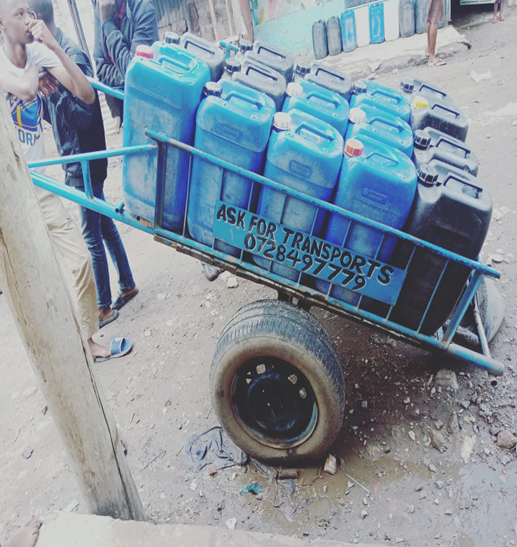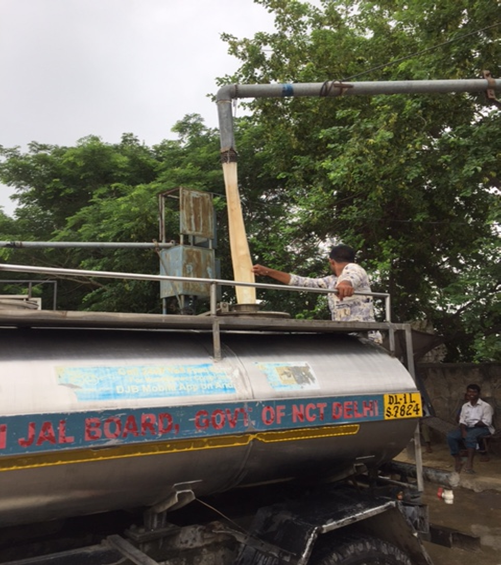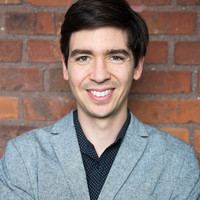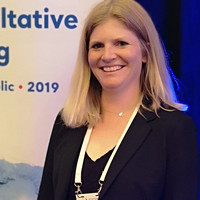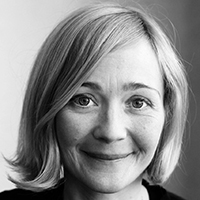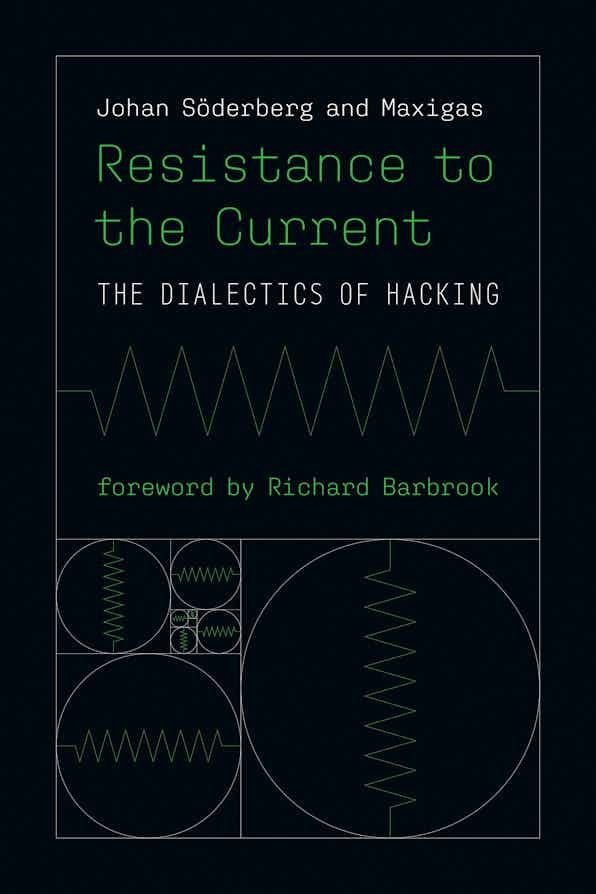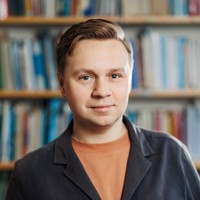
Erik Isberg, historian
A misconception continues throughout the history of online doctors
Technology has utopian potential, but why is it so difficult to realise it? Erik Isberg is looking for an answer in the history of technological remote care.
One afternoon in Boston in 1876, physician Clarence John Blake saw a telephone for the first time. I imagine him gently picking up the phone and holding it to his heart, whereupon his friend Alexander Graham Bell, who had been showing his new invention, looked at him questioningly. Why didn’t he hold the phone to his ear, as was intended? They began to discuss what kind of device they had in front of them. Their notions of the phone differed. Where Graham Bell saw a means of communication, Blake saw a kind of electronic distance stethoscope. The possibilities, Blake said, were enormous. Around Boston, people would hold the phone to their chests and let their heartbeats travel through the newly drawn-out telephone lines, finally landing in a liaison center where Blake and his colleagues sat ready to listen and diagnose.
A couple of years later, Blake was forced to state that despite diligent attempts, he was “nowhere near” to get a good enough sound quality. There would never be a liaison centre. The patients pressed their phones to their chests, but Blake only heard noise.
The dreams of practicing care remotely, despite Blake’s failure, have hardly disappeared. Today, the collection of health data constitutes a billion-dollar industry, app companies offer doctor’s visits via video calls, where crackly telephone lines have been replaced with high-resolution front cameras. In 2016, the then government and Sweden’s municipalities and regions decided that Sweden will be the world’s best country when it comes to digital care. Communication technology has never, the agreement wrote, offered such great opportunities.
On TikTok, a large amount of followers can take part in KaisTheSurgeon’s attempts to perform surgeries remotely. With the expansion of the 5G network, the idea is that remotely controlled scalpels will be able to carry out operations with the patient in one country, and the surgeon in another. While waiting for human patients, KaisTheSurgeon is allowed to hold on to fruit. In his almost hypnotic clips, he elegantly dissects grapes, bananas and oranges without being in the room himself.
When KaisTheSurgeon fillets an orange that is in the room next door, the future seems for a while both bright and high-tech. But while utopian promises of technological revolutions are succeeding each other, many of healthcare’s central problems don’t seem to be going away at all; It concerns accessibility, equality, staff density. Why is it so difficult to realize the utopian potential of technology?
The physician and medical historian Jeremy A. Greene argues in his book The Doctor Who Wasn’t There. History, Technology and the Limits of Telehealth that one reason why those who have made grand promises of technological innovations often found it difficult to realize them is a one-eyed focus on technology itself. Just because a technology exists and works, it is not obvious that you know how it will be used, or who will benefit from it.
In the late 1800’s, it wasn’t just Blake who experimented with the telephone. Exactly what one would use it for was unclear. It was used for live broadcasts of concerts as well as for private conversations. Gradually, it became clear that the phone had created a new kind of room: where you could be physically apart but still close. The voice could be disconnected from the body. But the telephone also became a symbol of modernity’s anonymous and lonely existence, where thin telephone lines were the only thing that bound the isolated individuals together. In Franz Kafka’s The Castle, the telephone is the tool of faceless bureaucracy. Protagonist K watches in despair as the bureaucrats make their calls, but what is actually being said and who it is that says it, remains unclear.
In healthcare, during the first decades of the 1900s, the telephone came to have an opposite symbolism. Rather than marking distance, it became an expression of a modern and alert medical profession that was constantly present. A doctor who didn’t answer the phone was not only archaic, but also bad at his job. In the United States, the new doctor role was summed up with a slogan: The doctor is on call.
Over time, other communication technologies came into the picture. But while they often worked excellently, Greene shows how this still wasn’t enough for them to be long-term successful. He finds one such example in a pilot project in Harlem, New York, in the early 1970s. In poor areas of America’s major cities, it was not uncommon at this time for an area to share a television antenna, which was then connected by telephone cables to the households around it. A group of doctors in Harlem realized that these local cable networks could be used to organize video meetings, thus reaching a group of patients who were used to a racist care system and were reluctant to seek care.
A local telemedicine system began to take shape: film cameras were rigged up in assembly halls around Harlem and nurses who themselves lived in the area were on hand to assist. The cable network was owned by the residents themselves. Although the project was not perfect, it showed a way forward for a democratically anchored remote care, which put the needs of the most vulnerable at the center. But this was not enough. In 1977, the project was discontinued. State money was running out and local cable networks had begun to be bought up by major telecom companies, with the aim of creating a national television market. Economics, not technology, decided the outcome.
If everything had instead been just about the performance of the technology, the story would have been different. Then all it took was for Blake’s liaison center to work is a good enough sound quality and the video calls in Harlem had continued as long as there were patients. Our delight in spectacular technical solutions obscures the view, all that other stuff – money, people, knowledge – crowds into the background.
The path from Clarence John Blake’s heartbeat liaison center to KaisTheSurgeon’s viral fruit surgeries may not be as long as it might seem. They both represent a utopian view of technology, which captures the potential of new technology but at the same time misses everything that is around and that is necessary for the technology to work. After all, it doesn’t really matter if the phone can perceive one’s heartbeat if there is no doctor to call. The opposite of presence, recalls technology historian Hannah Zeavin, is not distance, but absence. In KaisTheSurgeon’s comments section, one of his followers writes laconically: “That orange probably gets better health care than me”.
—
Literature:
- John Durham Peters, Speaking into the Air. A History of the Idea of Communication (Chicago: The University of Chicago Press, 2001).
- Jeremy A. Greene, The Doctor Who Wasn’t There. History, Technology and the Limits of Telehealth (Chicago: The University of Chicago Press, 2022).
- Hannah Zeavin, The Distance Cure. A History of Teletherapy (Cambridge, MA: MIT Press, 2021).
 Eglė Rindzevičiūtė is an Associate Professor of Criminology and Sociology, Kingston University London, with an interest in governance, knowledge production and culture. Her Friday talk with us is based on the forthcoming book, The Will to Predict: Orchestrating the Future through Science (Cornell 2023).
Eglė Rindzevičiūtė is an Associate Professor of Criminology and Sociology, Kingston University London, with an interest in governance, knowledge production and culture. Her Friday talk with us is based on the forthcoming book, The Will to Predict: Orchestrating the Future through Science (Cornell 2023).Achim Klüppelberg started as a doctoral student at the Division in the fall of 2018. He is active in the Nuclearwaters-Project (ERC Consolidator Grant, PI Per Högselius) where he focus on the nuclear history of Eastern Europe, especially on the territory of the former Soviet Union and its successor states. Achim investigates expert cultures in nuclear discourses, with a special interest in water-related issues in nuclear power plant decision-making.


